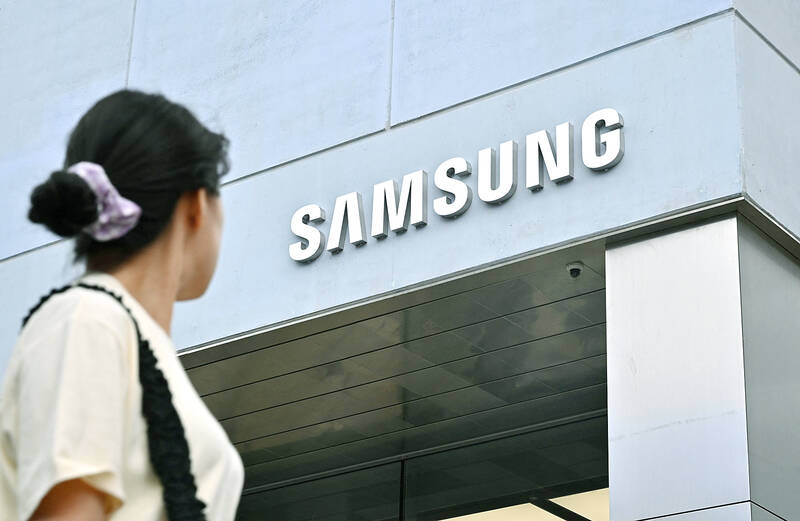Samsung Electronics Co’s chip foundry business is adding production capacity and more advanced manufacturing techniques, aiming to make gains on market leader Taiwan Semiconductor Manufacturing Co (TSMC, 台積電).
The South Korean company said that it would introduce 2-nanometer production for mobile phone parts by 2025 and expand applications.
Samsung would also significantly increase output in Pyeongtaek, South Korea, and Taylor, Texas, to shore up its foundry division, which makes chips for customers on a contract basis, the company said at a presentation on Tuesday in San Jose, California.

Photo: AFP
The world’s largest memorychip maker is looking to catch up with TSMC while also fending off a nascent challenge from Intel Corp, which is pushing into the foundry market.
While the chip industry in general is suffering from sluggish demand for mobile and personal computer parts, the artificial intelligence boom has spurred interest in advanced processors.
Samsung shared details of its 2-nanometer process technology, which would improve performance by 12 percent and power efficiency by 25 percent compared with its most advanced offering today, which is at 3 nanometers.
Like other chipmakers, Samsung is looking to geographically diversify its manufacturing footprint, which is heavily focused on East Asia.
The company, which has operated a facility in Austin for about 20 years, expects to complete the Taylor plant this year, aiming to commence operations in the second half of next year.
The expansion of production lines at Pyeongtaek along with the Taylor fab would boost Samsung’s capacity sevenfold by 2027 compared with 2021, the company said.
In addition to current chip manufacturing sites, Samsung plans to expand into a new Yongin production base.
US President Joe Biden’s administration is looking to cultivate domestic chip production with about US$50 billion in incentives. US officials have said they would give some of the funds to companies like Samsung and TSMC that are based overseas, but expanding on US soil.
Europe and Japan are also setting aside government money to foster the industry in those locations.
In the US, TSMC is building two fabs in Phoenix, Arizona, at which it is planning to make chips using its advanced 4-nanometer and 3-nanometer processes, with mass production scheduled to begin next year and in 2026 respectively.
The world’s largest contract chipmaker is also building a plant in Japan’s Kumamoto Prefecture, at which its 12-nanometer, 16-nanometer and 22-nanometer processes, as well as 28-nanometer specialty technology, would be used, with commercial production expected to start next year.
Meanwhile, a senior TSMC executive last month said that talks over a possible plant in Germany were continuing and that the earliest a decision would be made is in August.
Additional reporting by CNA and Reuters

NEW IDENTITY: Known for its software, India has expanded into hardware, with its semiconductor industry growing from US$38bn in 2023 to US$45bn to US$50bn India on Saturday inaugurated its first semiconductor assembly and test facility, a milestone in the government’s push to reduce dependence on foreign chipmakers and stake a claim in a sector dominated by China. Indian Prime Minister Narendra Modi opened US firm Micron Technology Inc’s semiconductor assembly, test and packaging unit in his home state of Gujarat, hailing the “dawn of a new era” for India’s technology ambitions. “When young Indians look back in the future, they will see this decade as the turning point in our tech future,” Modi told the event, which was broadcast on his YouTube channel. The plant would convert

‘SEISMIC SHIFT’: The researcher forecast there would be about 1.1 billion mobile shipments this year, down from 1.26 billion the prior year and erasing years of gains The global smartphone market is expected to contract 12.9 percent this year due to the unprecedented memorychip shortage, marking “a crisis like no other,” researcher International Data Corp (IDC) said. The new forecast, a dramatic revision down from earlier estimates, gives the latest accounting of the ongoing memory crunch that is affecting every corner of the electronics industry. The demand for advanced memory to power artificial intelligence (AI) tasks has drained global supply until well into next year and jeopardizes the business model of many smartphone makers. IDC forecast about 1.1 billion mobile shipments this year, down from 1.26 billion the prior

People stand in a Pokemon store in Tokyo on Thursday. One of the world highest-grossing franchises is celebrated its 30th anniversary yesterday.

Zimbabwe’s ban on raw lithium exports is forcing Chinese miners to rethink their strategy, speeding up plans to process the metal locally instead of shipping it to China’s vast rechargeable battery industry. The country is Africa’s largest lithium producer and has one of the world’s largest reserves, according to the US Geological Survey (USGS). Zimbabwe already banned the export of lithium ore in 2022 and last year announced it would halt exports of lithium concentrates from January next year. However, on Wednesday it imposed the ban with immediate effect, leaving unclear what the lithium mining sector would do in the